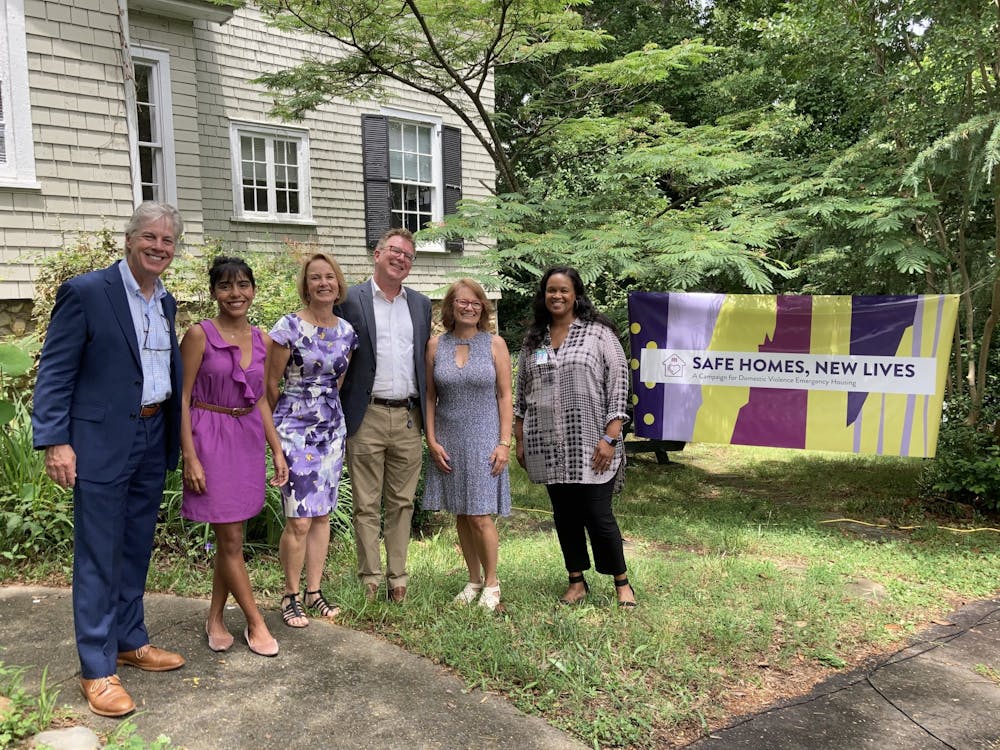Once the client transitions out of the apartment, they have access to transitional housing and can receive financial support for rent and other housing costs through the center’s Housing Micro-Grant Program.
Compass Center’s goal is to raise enough money to expand the program to six apartments and add an additional case manager to help more survivors.
The need for domestic violence emergency housing
The idea for Safe Homes came from a community needs assessment done by researchers at the UNC School of Social Work, which included participation from over 200 Orange County leaders, professionals, service providers and survivors.
The assessment determined that emergency housing was one of the most critical gaps in serving domestic violence victims in Orange County.
Rebecca Macy, a professor in the School of Social Work and one of the researchers who worked on the assessment, has been studying intimate partner violence for 19 years. She said housing is one of the biggest obstacles in attempting to leave an abusive relationship.
“Survivors said to us, ‘I stayed in a relationship much too long that was violent because I just didn't have any place else to go. I didn't want to uproot my kids again,’” Macy said.
In 2019, 253 people requested emergency housing, but the Compass Center was only able to place 15 adults and five children for brief hotel stays.
Prior to the Safe Homes project, the only other option was traditional shelters, which Macy said can have downsides, like not being accessible for victims with disabilities or being unable to accommodate people who don't speak English or have dietary restrictions.
“Shelters work for a lot of people, but they don’t work for everybody,” Macy said.
Macy also said perpetrators might know the location of a shelter. Research has shown that one of the most dangerous times for people who are trying to leave an abusive relationship is the initial time when they start to separate and try to establish safety.
After conversations with community stakeholders, they settled on the scattered emergency housing strategy as the best way to meet the needs of the community.
To get the day's news and headlines in your inbox each morning, sign up for our email newsletters.
“Having a place where people could go to be safe to kind of begin to get their lives back together, to reflect and to begin to implement some safety strategies was clearly the most pressing need that we were hearing from the community,” Macy said.
Prevalence of domestic violence in Orange County
Jeannie Denuo, a member of the Compass Center’s Board of Directors and a chairperson of the Safe Homes campaign, said that during the fundraising campaign for Safe Homes, people didn’t know the county had no emergency housing options.
“Nobody thought there was a need,” Denuo said. “To be honest, a lot of people in Orange County think, well, it just doesn't happen here.”
Amber Keith-Drowns, the victim services coordinator for the Orange County Sheriff’s Office’s Special Victims Unit, said the number of domestic violence protective orders has steadily climbed over the years.
In 2019, the sheriff’s office filed 121 protective orders, according to information from the Orange County Sheriff’s Office. In 2020, 164 orders were filed.
In both 2019 and 2020, around 94 percent of the total clients the SVU served were victims of domestic violence. But the actual number of clients who were victims increased from 1,236 in 2019 to 1,457 in 2020.
Denuo said that once they explained the need, people were eager to help.
“It is so heartwarming to see the incredible generosity of people,” Denuo said. “(It) was really great to see.”
Some of the apartment furniture was donated by community members, and Rivadeneyra said many community partners help the program. For example, the hunger-relief organization PORCH helps with groceries, and A Lotta Love helped decorate the first apartment.
The UNC School of Social Work has started planning a follow-up evaluation study with Compass Center that will hopefully be launched late summer or early fall.
Macy said the assessment was a community effort.
“It wouldn't have happened if people didn't show up and give their opinions, their time and energy,” Macy said. “It really renewed my faith in our community.”
Denuo said Compass Center relies heavily on volunteers and is always looking for people who are interested. To learn more about volunteering, visit the center’s website.
To make a donation to Safe Homes, visit the project’s webpage. The program also has an Amazon wishlist of items it needs.
@kecarpenter1
@DTHCityState | city@dailytarheel.com




